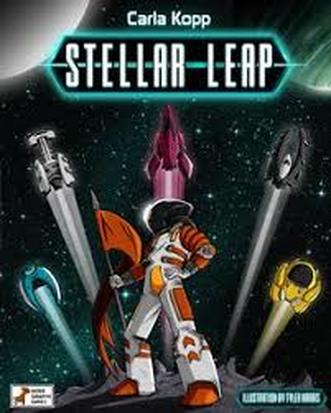 Full Disclosure: Weird Giraffe Games provided me with a review copy of Stellar Leap. What is this game about? Stellar Leap, designed by Carla Kopp and published by Weird Giraffe Games, is a light, fast-playing 4X game in which you gather resources, complete missions, explore space, and occasionally attack your competitors. You will represent one alien species and hopefully lead it to interstellar prominence by gaining the most prestige points. Each turn, you will gather resources and then take up to two High Command actions (e.g. populate, discover new planets, tax your people to gather specific resources, or attack), as well as up to three Division actions (complete a mission, mine an asteroid, or put your citizens to work in pursuit of further resources). Actions may be taken in any order you choose, and you can move your population around freely, provided you have the resources to do so (it takes oxygen and fuel to travel). This may seem like a lot of actions, but you will always feel a little squeezed because there will be so much you want to accomplish. This game is an interesting mix of luck and skill. Stellar Leap's variability adds a bit of excitement and keeps the game from getting repetitive. While some achievements will earn you a consistent number of points from game to game, you also begin the game with a secret objective that may influence your strategy. You'll roll dice to acquire resources, but you aren't just left to the whims of fate—the location of your planets and the die manipulation powers you are given at the start of the game give you a lot of options. And while you are in complete control of your actions, the planets you discover and the events you trigger are based on the luck of the draw. How does it play solo? I am really impressed with the solo modes (yes, plural!) for Stellar Leap. It is very obvious that Carla Kopp put a lot of thought into making her game a strong experience for solo players, and it definitely pays off. Stellar Leap comes with three solo opponents, whose actions and scoring conditions are condensed onto easy-to-deal-with cards. Even more interesting is that once you have played each of your opponents separately, you can mix and match them to create new challenges within the game.  Cosmosaurus! Cosmosaurus! Overall Thoughts Stellar Leap is a very good gaming experience overall, and a strong choice for an intro-level 4X game—one that offers a substantial experience but doesn't overstay its welcome. Between different dice manipulation powers, discovered planets, and asymmetrical scoring conditions, each game plays differently, which forces you to adjust your strategy a bit each time. I enjoy deciding whether to focus on discovery, on expanding my population, or on completing missions. You can do a bit of each in a game, but you can't do them all to the fullest, so you have to choose wisely. I also find each of the AI opponents to be a challenge, and have enjoyed pitting myself against them while equipped with differing powers and objectives. Nothing makes me happier than when a designer puts a lot of thought into creating an interesting solo experience, one that doesn't just feel like going through the motions, one that doesn't feel exactly the same every time. In fact, it's clear that a lot of thought has gone into the player's experience in Stellar Leap generally—the rulebook is crystal clear, the player board is designed to help you remember what to do, the AI upkeep is lightning fast. Although Stellar Leap has several great aspects to its gameplay, a couple might benefit from some tweaks. It is a light 4X, but it's definitely weakest on the eXterminate front. In some ways, that is a relief for me—I don't particularly love aggressive games, especially when playing with other people. But attacks in Stellar Leap pull their punches, and sometimes that means that you don't bother to attack at all. It is possible to earn some prestige points from attacks, but all you can do to your enemies is make them scatter to other planets. You can't eliminate enemy populations or steal resources, just rearrange the board state. I think this was more problematic when dealing with AI opponents who have unlimited resources—for example, attacks do nothing to the "Overpopulator" AI who spreads to different planets, because you can't use attacks for population control OR area control. Enemies you displace will simply move back to the planets you kicked them off of, and their movement is unlimited. (In the multiplayer game, players must spend resources to move, which would mean they were more inconvenienced by an attack.) There is a more aggressive attack variant, but it doesn't quite pack enough punch to thwart an AI opponent with unlimited resources. While I love the different die manipulation powers, some are distinctly better than others, at least in my opinion. I'll take an "adjust up X die values" over a "reroll" any day. And when dealing with AI opponents who have specific strategies, some scoring objectives will be powerful, while others force you into a pretty rough spot, depending on what you're up against. For example, if your AI opponent isn't focused on completing missions, you can go wild with the objective that gives you bonus points for completing missions because there is literally no competition for them. But if you pull the "Friendly" card, which allows you to gain points for every population member that shares a planet with a rival species, the AI that scores off of overpopulating planets will wipe the floor with you. In a lot of ways, that's just part of the game—but feel free to tinker with combinations that are too easy or too hard for you, no matter which cards you actually draw. Stellar Leap does also make accommodations for preferences like this by having players draw two cards and choose one when selecting their species powers and objectives. Do I recommend it? Yes. Stellar Leap is a strong gaming experience that repays repeat play and experimentation. I don't feel done with it yet, and definitely plan to keep tinkering with my strategies in response to different AI combinations. Also, for solo players, the thought that has gone into the AI is impressive, and I want to see care like that put into more of the games I play. If you are looking for a super thematic storytelling experience, you may want to look elsewhere--Stellar Leap has a lot of personality in its design, but it is ultimately about working the system and earning those prestige points. But if you want to test yourself against an interesting game system again and again, then Stellar Leap is a great choice for you. Overall Rating: 4 stars Rating Scale: 5 stars — I love it! 4 stars — I really like it. 3 stars — I like it. 2 stars — It's okay. 1 star — Meh.
1 Comment
1/8/2020 02:55:30 am
Thank you for the review. It has been the last push to get the game.
Reply
Your comment will be posted after it is approved.
Leave a Reply. |
AuthorMy name is Liz Davidson, and I play solo board games. A lot of solo board games... Archives
August 2021
Categories
All
|
 RSS Feed
RSS Feed